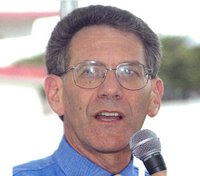The Transportation Infrastructure and Services (TIS) Steering Committee and Large Cities Council (LCC), met jointly in Laramie, Wyo., from September 4-6 to discuss some of the key issues surrounding transportation.
With the upcoming expiration of Safe, Accountable, Flexible, Efficient Transportation Equity Act: A Legacy for Users( SAFETEA-LU), the revenue shortfall in the Highway Trust Fund, increased cost of gas and overall state of the economy and the environment, both the TIS steering committee and LCC faced the meeting with a full agenda on what’s going on with transportation at the federal, state, and local levels.
The LCC, formerly known as the Central Cities Council, met on its own to review results of a survey sent out in July. The survey was developed to gauge the biggest issues for large cities in a variety of policy areas. The survey will help guide the LCC’s work for the next few years.
The LCC also heard from Dr. Marc Weiss at Global Urban Development on his work on the Climate Prosperity Project. This project is in its initial phase and it is geared to educate the public on the idea that climate prosperity is vital to economic development. Their message is that rather than climate action being costly and harmful to the economy, climate protection saves everyone money by spending less on energy through increased conservation and efficiency. The Climate Prosperity Project plans to release its first-ever guidebook in October. The guidebook will provide information on how to design and implement climate change policies and programs most effectively and creatively.
Committee and council members heard from Joshua Schanck, director of transportation research, Bipartisan Policy Center, and Paul Schmid, legislative assistant, Rep. Ellen Tauscher’s (D-Calif.) office about the state of transportation funding and what the outlook was like on the upcoming expiration of SAFETEA-LU.
This was followed by a panel of speakers on regional transportation planning. Christy McFarland, NLC research manager, presented an overview of regional transportation planning and how it relates to local land use decisions.
Council Member Susan Burgess, board representative to the TIS steering committee, talked about her city, Charlotte, N.C., and the regional collaboration that has taken place there. She highlighted the fact that regional transportation strategies and local land use strategies go hand in hand and the value of a regional organization, such as a metropolitan planning organization (MPO), to manage this.
Steven Rudy, director of transportation planning and operations at the Denver Regional Council of Governments (DRCOG), talked about the success of DRCOG, the regional MPO, in the Denver area’s FasTrack project and transit-oriented development.
“The speakers were informative and caused the group to join in with lots of good dialogue on land use as related to transit oriented development,” said Council Member Kathryn Wilemon, Arlington, Texas. “We always leave these TIS meetings with new thoughts on addressing the transportation challenges in our own cities and regions as well as updates on the legislation affecting the needs of the country.”
The TIS committee reviewed the U.S. DOT’s proposal on surface transportation funding. The committee had concerns with several components of the proposal, especially the replacement of MPOs with a new body, the Metropolitan Transportation Board (MTBs).
Several other members at the meeting shared their experiences of the value of an MPO. The proposal ignores the already established and functioning MPOs that have made significant strides in coordinating regional transportation planning and have helped influence land use practices. To abolish one entity in favor of a new one, which would require significant changes in state, local and regional policies, is counterproductive.
The committee also voiced its concerns with the other components of the proposal, such as the emphasis on direct road and congestion pricing, instituting benefit-cost analysis, and cost comparisons between public-private partnerships and federal funding for projects of more than $250 million. Several members volunteered to send local examples of various problems they have seen with some of the components, such as benefit-cost analysis, that staff will keep to further strengthen NLC’s position on this proposal.
The TIS committee concluded its meeting with a review of policy amendments and resolutions for 2009.
(Note: Mayor Kaplan is a member of the TIS Steering Committee, and was in attendance during this meeting)
Subscribe to:
Post Comments (Atom)


No comments:
Post a Comment